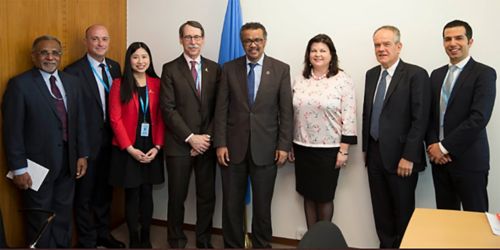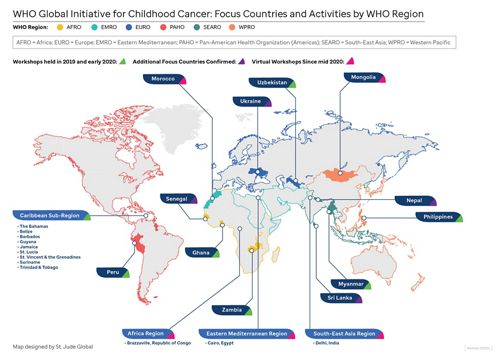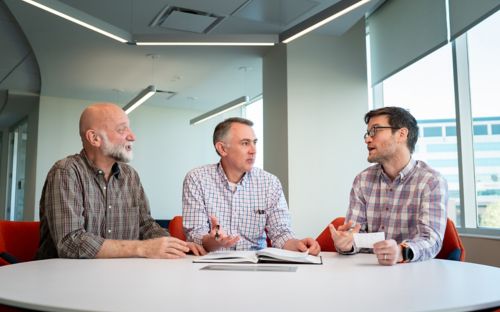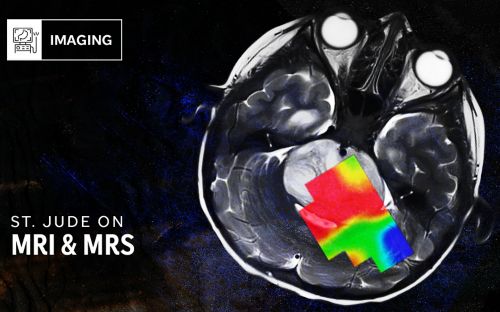Launching CureAll: the road for countries to improve global pediatric cancer care, save a million lives and reduce suffering for all

In March 2018, the World Health Organization (WHO) Director-General designated St. Jude as the WHO Collaborating Centre for Childhood Cancer. In September that year, St. Jude joined WHO and other global partners to launch the Global Initiative for Childhood Cancer at the United Nations (pictured here). The Global Initiative aims to save 1 million more children by 2030, while improving children’s quality of life.
The story of St. Jude Children’s Research Hospital is one of inclusion to find cures and save lives that started in 1962. Since that time, St. Jude has sought ways to broaden beyond U.S. borders its mission that no child should die in the dawn of life, partnering with institutions around the globe that share this dream.
Since the launch of St. Jude Global in 2018, we have united with even more friends and collaborators who are all committed to this vision to provide access to quality care and treatment to every child with cancer and other catastrophic diseases, no matter where in the world they live. In an effort to reduce disparities in access to care, St. Jude supports advancement of care through the development of comprehensive initiatives in capacity building, education and research.
In March 2018, the World Health Organization (WHO) Director-General designated St. Jude as the WHO Collaborating Centre for Childhood Cancer. In September that year, St. Jude joined WHO and other global partners to launch the Global Initiative for Childhood Cancer at the United Nations. The Global Initiative aims to save 1 million more children by 2030, while improving children’s quality of life. Specifically, the Initiative targets an approximate worldwide doubling of survival rates for six common pediatric cancers. St. Jude has been a key part of this Initiative from its conception, through the vision of Drs. James Downing and Carlos Rodriguez-Galindo who first met with senior leaders at WHO Headquarters in Geneva in January 2018. This Initiative has further progressed today with the CureAll technical package rolling out.
Today on February 15, 2021, St. Jude joined our global partners in commemorating International Childhood Cancer Day with WHO’s release of the Global Initiative for Childhood Cancer CureAll technical package in a special event that raised further awareness about the opportunities to improve childhood cancer outcomes through implementation of the CureAll approach.
Cancer remains a leading cause of death for children throughout the world. The vast majority of the 400,000 children who develop cancer every year live in low- and middle-income countries.
Many of these children have limited access to quality care, including trouble obtaining a cancer diagnosis or obtaining timely treatment, supportive care and follow-up. For these children, the CureAll package will provide the framework of action to reduce these health disparities in all countries and help reduce the suffering too many children experience today.
Bringing All hands in for the Global Initiative: the CureAll approach
St. Jude Global has worked closely with WHO, partners at International Society of Paediatric Oncology (SIOP), Childhood Cancer International (CCI), other leading organizations and partners across the St. Jude Global Alliance to identify the key actions and elements for success to achieve the Global Initiative targets. The CureAll technical package launched today outlines the path for policy-makers, programme managers and hospital administrators to join the global childhood cancer community to achieve these goals in their country, region and globally.
The CureAll framework is sustained by four pillars, each one outlining specific guided actions:
C – Centers of excellence and care networks with enough trained staff to deliver services
U – Universal health coverage and supports to provide patients access to quality services
R – Regimens and roadmaps coupled with essential technologies and medicines to deliver evidence-based diagnosis, treatment and care
E – Evaluation and monitoring to ensure effective implementation, quality assurance and constant improvement
The 4 pillars of action are supported by 3 enablers:
A – Advocacy to engage all groups and sectors in society, including patients, parent advocates, foundations, health professionals, researchers, leaders and decision-makers
L – Leveraged financing options and tools to help decision-makers identify and prioritize resources to meet the needs of children with cancer and their local health systems in sustainable ways
L – Linked policies and governance, including national cancer control plans and staffed programmes that specifically integrate the needs of children with cancer, bringing together the needs and priorities across the other pillars and enablers

Focus countries with formal ministry engagement as part of the Global Initiative for Childhood Cancer as of February 2021 include:
- Ghana
- Mongolia
- Morocco
- Myanmar
- Nepal
- Peru
- Philippines
- Senegal
- Sri Lanka
- Ukraine
- Uzbekistan
- Zambia
Focus countries demonstrate early measurable progress, a strong political commitment and advances in one or more pillars of CureAll while providing feedback for the refinement of tools. Regional collaborative discussions have also been initiated in multiple settings.
The work of the Global Initiative is supported by a range of WHO resources, including a $15 million commitment from St. Jude, collaborative groups and networks, tools to improve access to medical equipment and medicines, and comprehensive datasets. The Global Initiative has also energized the international community. This has strengthened commitments from local leaders, which in turn has led to visible momentum and progress in focus countries across all WHO regions, including Peru, Philippines and Sri Lanka. Both within and beyond focus countries, groups have come together to assess the current situation and add fresh ideas on how everyone can contribute as individuals, programs, hospitals, networks, countries, regions and globally. As an example, a global call for All Hands In to CureAll was raised during the St. Jude Global Alliance Convening event in December 2020. This generated videos, live-group brainstorms, and photo stories from all corners of the world illustrating how partners are contributing together toward CureAll, with All Hands In.
Accelerating CureAll: Novel tools
Along with a guiding document summarizing the CureAll approach, the technical package released by WHO this week includes a multilingual interactive online platform and a comprehensive assessment tool to help define approaches suitable for each country. The WHO Knowledge Action Portal (KAP) is a virtual community of practice for those working in noncommunicable diseases within ministries of health, and for the first time, has new features and content designed specifically to spotlight childhood cancer. The KAP is designed for interaction and collaboration, connecting ministries with resources and opportunities to exchange knowledge and improve practices, establish partnerships, and contribute to global efforts in cancer control. Supporting vibrant communities of practice is one of the core mandates of our work at St. Jude as the WHO Collaborating Centre for Childhood Cancer, and the KAP will be able to link to content and platforms from the St. Jude community.
The call to action from children with cancer
Global childhood cancer rates are on the rise. Even so, it’s estimated that nearly half of the world’s children with cancer today are not diagnosed.
Years ago, St. Jude committed to spreading its mission throughout the world. To date, St. Jude Global includes seven regions: Asia Pacific, Central and South America, China, Eastern Mediterranean, Eurasia, Mexico and Sub-Saharan Africa. We’re sharing our resources, knowledge and skills to create a global network with the collective vision of ensuring that all children with cancer and other catastrophic diseases will have access to quality care and treatment no matter where they live. Working with WHO as its only Collaborating Centre for Childhood Cancer has allowed St. Jude to expand its efforts: increasing our collaboration with other organizations and deepening our relationship with institutions in other countries.
Through the Global Initiative for Childhood Cancer, we have already seen many come forward to say, “Never before could we have imagined…” We now can imagine and walk forward together toward the ambitious targets of the Initiative, with all hands in. St. Jude opened its doors when childhood cancer was a death sentence. We have since contributed to the science that changed this dramatically over the past 50 years, proving that cancer is curable and that children can thrive after their cancer diagnosis when they have access to quality diagnostic, therapeutic and supportive care. Many high-income nations have this, and now we have to work together toward the day when all children throughout the world can be cured. The children of the world, their families and the clinicians who serve them are depending on it.

St. Jude has been a key part of the WHO Global Childhood Cancer Initiative from its conception, through the vision of Drs. James Downing and Carlos Rodriguez-Galindo who first met with senior leaders at WHO Headquarters in Geneva in January 2018. Pictured, left to right, in 2018 are Cherian Varghese, MBBS, MD, M Phil, PhD, WHO coordinator, Management of Noncommunicable Diseases; Carlos Rodriguez-Galindo, MD, director of St. Jude Global; Catherine Lam, MD, MPH, director of the Asia Pacic Regional Program and Health Systems Unit, St. Jude Global, and co-director of the World Health Organization Collaborating Centre for Childhood Cancer; James Downing, MD, St. Jude president and CEO; WHO Director-General Tedros Adhanom Ghebreyesus; Svetlana Akselrod, director of the WHO Global Noncommunicable Disease Platform Department; Etienne Krug, MD, MPH, WHO director of the Department for Management of Noncommunicable Diseases, Disability, Violence and Injury Prevention; André Ilbawi, MD, WHO manager of the Department for Management of Noncommunicable Diseases, Disability, Violence and Injury Prevention.






